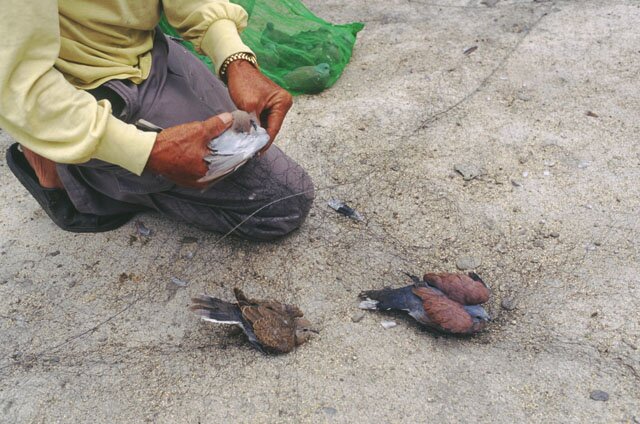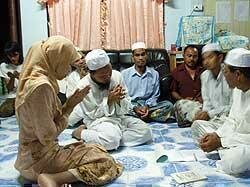BROWSE COUNTRIES/ TERRITORIES
Does communication save lives?
When disaster strikes, the usual suspects to turn up on the scene are those bringing water, food and shelter. Yet there is something that is just as, if not more, critical.
Pakistan earthquake in 2005
When an earthquake struck Pakistan's North-West Frontier Province in 2005, landslides blocked vehicle access to the mountain areas, leaving the worst-hit locals stranded. Essential supplies had to reach them soon. To get there, the Telecoms San Frontieres (TSF) team had to lace up their boots and walk. Simon Genin was one of those who did.
The TSF team is usually the second or third to be deployed to the scene of emergency. Genin recalls how grateful villagers shared emergency ration biscuits with him and the other foreigners who came to help.
One of the key equipment the team sets up in these situations are satellite phones, which can function even when local infrastructure has been destroyed. In Pakistan, villagers were allowed to make free calls to their loved ones. When they gave the handset back, smiling after having spoken to their family, it was hard for everyone present not to get emotional.
Like other relief agencies, TSF deploys its teams within 24 hours of a disaster. Their objective is to open a line of communication for the victims and the relief workers arriving on the scene. Once this is done, the most dire needs and reports on the ground can be conveyed immediately to those waiting for information.

TSF Team in Lebanon in 2006
Of course, allowing unfettered access to disaster-struck regions may not always sit comfortably with local governments. During last year's cyclone in Myanmar, the TSF team waited desperately in Bangkok – like other non-governmental organisations – for their visas to be issued. Eventually, the team had to give up because of the restrictions placed on their work by the Myanmar authorities.
That was the first time TSF failed to deploy its volunteers. They realised the world was not quite like its name suggests, “without borders”. For the organisation to operate, it has to get permission from local governments. In Asia this often becomes a tricky issue because of the nature of TSF’s work. Many Asian countries have tight controls over telecommunications, which they deem to be an issue of national security. Just a few weeks later, their assistance in China following the Sichuan earthquake would also be politely declined. These are difficulties that TSF is working to circumvent by fostering ties with regional governments, establishing links with local NGOs, and continuing to work closely with the United Nations.
The group also has several long-term projects running, in addition to emergency work. At a stream that runs through a rural part of the Southeast Asian mainland, locals have created their own border-crossing. Burmese villagers arrive at a Thai clinic for check-ups, especially for malaria, a disease that thrives in the region's wet tropical climate. Twenty years of records at the clinic generate a fair amount of paper work. TSF has undertaken a three-year effort to store the data on a computer system, which will make it easier for the workers to access.

A Sri Lankan woman makes her first phone call after the tsunami
With us talking on our mobile phones and sitting at our computers everyday, as we do now, technology has become for most of us something we take for granted. But in times of need, they can be a literal lifeline.
During the severe riots that rocked Haiti in 2008, a pregnant woman started getting contractions. The chaotic conditions prevented a medical team from being deployed. She could have become yet another statistic in the Caribbean nation's astoundingly high maternal mortality rates, but a call on a satellite phone got a helicopter despatched from the capital Port-au-Prince. Her life was saved.
Hard as it may be to quantify the work of TSF, the group has become an integral part of emergency relief operations, the way technology has become such a significant part of our lives.
Photos by Telecom Sans Frontiers
Login or Register
 Dan-Chyi Chua began her writing career with Channel News Asia, a regional cable network, before forsaking broadcast journalism to hit the road for a three-year sabbatical through the Middle East, China, Central America and Cuba. She has now grounded herself as a writer for asia! Magazine.
Dan-Chyi Chua began her writing career with Channel News Asia, a regional cable network, before forsaking broadcast journalism to hit the road for a three-year sabbatical through the Middle East, China, Central America and Cuba. She has now grounded herself as a writer for asia! Magazine.
- Asian Dynasties and History
- Conservation of the Environment
- Definition: Culture
- Economy and Economics
- Food and Recipe
- Geopolitics and Strategic Relations
- Health and Body
- Of Government and Politics
- Religion and Practices
- Social Injustices and Poverty Report
- Society, Class and Division
- Unrest, Conflicts and Wars

































 Another Point
Another Point From Jerusalem to the West Bank
From Jerusalem to the West Bank
Comments
Post new comment